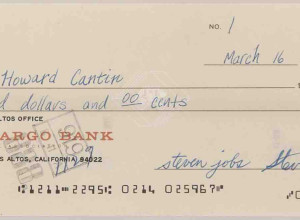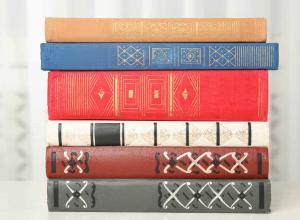October 29, 2014 |
The Past & The Future of Special Collections
Last week, a national colloquium on special collections was held at Case Western Reserve University's Kelvin Smith Library. Acknowledging the Past, Forging the Future, a two-day event, brought together librarians, private book collectors, and antiquarian booksellers.
 A recap of day 1: Sarah Thomas, vice president of Harvard Library and Roy E. Larsen librarian for the faculty of arts and sciences, gave the opening keynote address and spoke about providing "maximum access through minimal processing." Alice Schreyer, interim library director and associate university librarian for area studies and special collections at the University of Chicago Library, gave the session 1 keynote, in which she focused on the value of private collectors. FB&C columnist Joel Silver, director and curator of books at Indiana University's Lilly Library, moderated the first discussion on the changing nature of book collecting. A second keynote was given by Jay Satterfield, special collections librarian at Dartmouth College, who used his experience with students to talk about access to collections.
A recap of day 1: Sarah Thomas, vice president of Harvard Library and Roy E. Larsen librarian for the faculty of arts and sciences, gave the opening keynote address and spoke about providing "maximum access through minimal processing." Alice Schreyer, interim library director and associate university librarian for area studies and special collections at the University of Chicago Library, gave the session 1 keynote, in which she focused on the value of private collectors. FB&C columnist Joel Silver, director and curator of books at Indiana University's Lilly Library, moderated the first discussion on the changing nature of book collecting. A second keynote was given by Jay Satterfield, special collections librarian at Dartmouth College, who used his experience with students to talk about access to collections.
 A recap of day 2: Geoffrey Smith, head of the rare books & manuscript library, at Ohio State University, moderated a second panel on private book collecting and donors, in which Sotheby's Selby Kiffer mentioned the rise of "highlight" or "cool stuff" collecting as opposed to the "in-depth" collecting more common in the past. (We particularly appreciate collector Jon Lindseth's admonition to the audience: "You need to subscribe to FB&C.") Stephen Enniss, director of the Harry Ransom Center at the University of Texas at Austin, gave the third keynote on special collections in the age of digital scholarship. This was followed by a panel and audience discussion on that topic, moderated by Daniel Cohen, associate professor, department of history & art at Case Western Reserve University. Mark Dimunation, chief of the rare book and special collections division at the Library of Congress, seen above, gave the closing keynote, titled "The Once and Future Special Collections." He spoke of reconceptualizing special collections as a "center of knowledge" which requires unlocking the backlog, utilizing crowdsourcing, and "bring[ing] the data forward."
A recap of day 2: Geoffrey Smith, head of the rare books & manuscript library, at Ohio State University, moderated a second panel on private book collecting and donors, in which Sotheby's Selby Kiffer mentioned the rise of "highlight" or "cool stuff" collecting as opposed to the "in-depth" collecting more common in the past. (We particularly appreciate collector Jon Lindseth's admonition to the audience: "You need to subscribe to FB&C.") Stephen Enniss, director of the Harry Ransom Center at the University of Texas at Austin, gave the third keynote on special collections in the age of digital scholarship. This was followed by a panel and audience discussion on that topic, moderated by Daniel Cohen, associate professor, department of history & art at Case Western Reserve University. Mark Dimunation, chief of the rare book and special collections division at the Library of Congress, seen above, gave the closing keynote, titled "The Once and Future Special Collections." He spoke of reconceptualizing special collections as a "center of knowledge" which requires unlocking the backlog, utilizing crowdsourcing, and "bring[ing] the data forward."
According to Melissa Hubbard, head of special collections & archives at the Kelvin Smith Library, a video recording will be posted to the university's YouTube channel in a couple of weeks.
For those of you who wish to read longer, intelligent analysis of the speeches and panels, I direct you to a series of posts (links below) on the Exlibris electronic mailing list by Terry Belanger, retired founding director and current faculty member of Rare Book School. He writes in his first dispatch, "...the presentations were without exception worth listening to, and conference arrangements were superb."
I was disappointed to read, in report #2, that the "CLIR has decided to discontinue its current hidden collections program, revamping it to focus it on digitization projects. There is a blog on the CLIR thought processes." Especially since, in report #3, Satterfield admits that even at Dartmouth, "we have 100-year backlogs."
I - https://list.indiana.edu/sympa/arc/exlibris-l/2014-10/msg00168.html
II - https://list.indiana.edu/sympa/arc/exlibris-l/2014-10/msg00169.html
III - https://list.indiana.edu/sympa/arc/exlibris-l/2014-10/msg00172.html
IV - https://list.indiana.edu/sympa/arc/exlibris-l/2014-10/msg00185.html
V - https://list.indiana.edu/sympa/arc/exlibris-l/2014-10/msg00187.html
VI - https://list.indiana.edu/sympa/arc/exlibris-l/2014-10/msg00190.html
VII - https://list.indiana.edu/sympa/arc/exlibris-l/2014-10/msg00194.html
VIII - https://list.indiana.edu/sympa/arc/exlibris-l/2014-10/msg00210.html
IX - https://list.indiana.edu/sympa/arc/exlibris-l/2014-10/msg00234.html
Images Courtesy of the Kelvin Smith Library, Case Western Reserve University.
 A recap of day 1: Sarah Thomas, vice president of Harvard Library and Roy E. Larsen librarian for the faculty of arts and sciences, gave the opening keynote address and spoke about providing "maximum access through minimal processing." Alice Schreyer, interim library director and associate university librarian for area studies and special collections at the University of Chicago Library, gave the session 1 keynote, in which she focused on the value of private collectors. FB&C columnist Joel Silver, director and curator of books at Indiana University's Lilly Library, moderated the first discussion on the changing nature of book collecting. A second keynote was given by Jay Satterfield, special collections librarian at Dartmouth College, who used his experience with students to talk about access to collections.
A recap of day 1: Sarah Thomas, vice president of Harvard Library and Roy E. Larsen librarian for the faculty of arts and sciences, gave the opening keynote address and spoke about providing "maximum access through minimal processing." Alice Schreyer, interim library director and associate university librarian for area studies and special collections at the University of Chicago Library, gave the session 1 keynote, in which she focused on the value of private collectors. FB&C columnist Joel Silver, director and curator of books at Indiana University's Lilly Library, moderated the first discussion on the changing nature of book collecting. A second keynote was given by Jay Satterfield, special collections librarian at Dartmouth College, who used his experience with students to talk about access to collections.  A recap of day 2: Geoffrey Smith, head of the rare books & manuscript library, at Ohio State University, moderated a second panel on private book collecting and donors, in which Sotheby's Selby Kiffer mentioned the rise of "highlight" or "cool stuff" collecting as opposed to the "in-depth" collecting more common in the past. (We particularly appreciate collector Jon Lindseth's admonition to the audience: "You need to subscribe to FB&C.") Stephen Enniss, director of the Harry Ransom Center at the University of Texas at Austin, gave the third keynote on special collections in the age of digital scholarship. This was followed by a panel and audience discussion on that topic, moderated by Daniel Cohen, associate professor, department of history & art at Case Western Reserve University. Mark Dimunation, chief of the rare book and special collections division at the Library of Congress, seen above, gave the closing keynote, titled "The Once and Future Special Collections." He spoke of reconceptualizing special collections as a "center of knowledge" which requires unlocking the backlog, utilizing crowdsourcing, and "bring[ing] the data forward."
A recap of day 2: Geoffrey Smith, head of the rare books & manuscript library, at Ohio State University, moderated a second panel on private book collecting and donors, in which Sotheby's Selby Kiffer mentioned the rise of "highlight" or "cool stuff" collecting as opposed to the "in-depth" collecting more common in the past. (We particularly appreciate collector Jon Lindseth's admonition to the audience: "You need to subscribe to FB&C.") Stephen Enniss, director of the Harry Ransom Center at the University of Texas at Austin, gave the third keynote on special collections in the age of digital scholarship. This was followed by a panel and audience discussion on that topic, moderated by Daniel Cohen, associate professor, department of history & art at Case Western Reserve University. Mark Dimunation, chief of the rare book and special collections division at the Library of Congress, seen above, gave the closing keynote, titled "The Once and Future Special Collections." He spoke of reconceptualizing special collections as a "center of knowledge" which requires unlocking the backlog, utilizing crowdsourcing, and "bring[ing] the data forward."According to Melissa Hubbard, head of special collections & archives at the Kelvin Smith Library, a video recording will be posted to the university's YouTube channel in a couple of weeks.
For those of you who wish to read longer, intelligent analysis of the speeches and panels, I direct you to a series of posts (links below) on the Exlibris electronic mailing list by Terry Belanger, retired founding director and current faculty member of Rare Book School. He writes in his first dispatch, "...the presentations were without exception worth listening to, and conference arrangements were superb."
I was disappointed to read, in report #2, that the "CLIR has decided to discontinue its current hidden collections program, revamping it to focus it on digitization projects. There is a blog on the CLIR thought processes." Especially since, in report #3, Satterfield admits that even at Dartmouth, "we have 100-year backlogs."
I - https://list.indiana.edu/sympa/arc/exlibris-l/2014-10/msg00168.html
II - https://list.indiana.edu/sympa/arc/exlibris-l/2014-10/msg00169.html
III - https://list.indiana.edu/sympa/arc/exlibris-l/2014-10/msg00172.html
IV - https://list.indiana.edu/sympa/arc/exlibris-l/2014-10/msg00185.html
V - https://list.indiana.edu/sympa/arc/exlibris-l/2014-10/msg00187.html
VI - https://list.indiana.edu/sympa/arc/exlibris-l/2014-10/msg00190.html
VII - https://list.indiana.edu/sympa/arc/exlibris-l/2014-10/msg00194.html
VIII - https://list.indiana.edu/sympa/arc/exlibris-l/2014-10/msg00210.html
IX - https://list.indiana.edu/sympa/arc/exlibris-l/2014-10/msg00234.html
Images Courtesy of the Kelvin Smith Library, Case Western Reserve University.















